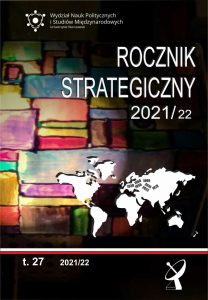Przegląd sytuacji międzynarodowej: aspekty globalne i regionalne
A review of 2021/21: Global and regional aspects
Author(s): Roman KuźniarSubject(s): Economic policy, Security and defense, Geopolitics, Peace and Conflict Studies, Russian Aggression against Ukraine
Published by: Wydawnictwo Naukowe Scholar Sp. z o.o.
Keywords: fall of Kabul; AUKUS; EU stability fund; Russian aggression on Ukraine; refugees; Pegasus; Dworczyk’s e-mails; Nord Stream 2; Indo-Pacific;
Summary/Abstract: From a strategic point of view, there were two developments which dominated the year 2021. First, something inevitable – the end of the Western military presence in Afghanistan. Something we had got used to and that was supposed to happen, but the dramatic scenes from the fall of Kabul in August 2021 underlined a closure of the era of global primacy of the West. The rising military assertiveness of Russia was the second one. Using the threat of force, Moscow tried to get Western consent to the strategic and political submission of Ukraine to its will and the change of the geostrategic status of Central Europe (withdrawal of NATO defence infrastructure and of even symbolic numbers of military troops from the region). Facing strong resistance of the West and Ukraine to Russian demands, Moscow decided to go ahead with a direct armed aggression, which began on 24 February 2022. Despite the change in Germany (departure of chancellor Angela Merkel), the West managed to consolidate its position due to the resolve and competent leadership of the new American administration of Joe Biden. The COVID-19 pandemic as well as Western containment (e.g. establishing AUKUS) frustrated the Chinese ambition to move to the top position in global politics. Beijing, in the meantime, focused on centralizing its power structure and weakening its ties with the West.
Journal: Rocznik Strategiczny
- Issue Year: 2022
- Issue No: 27
- Page Range: 69-96
- Page Count: 28
- Language: Polish

